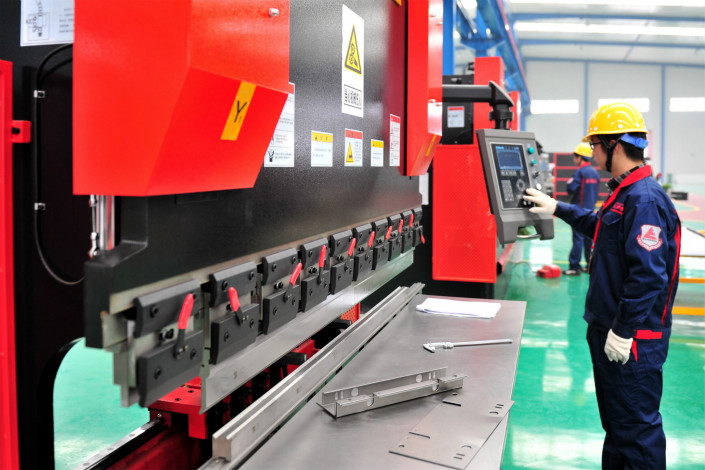China’s Machine Tool Industry Manufactures Better First Half

That buzzing sound? That’s the first-half performance of China’s machine tool industry — at least its privately run firms.
After a prolonged downward period beginning in 2011, the sector is showing strong signs of recovery. Among 14 machine tool firms listed on either the Shanghai or Shenzhen stock exchanges, eight reported profit growth in the first half of 2017 compared with the same period last year; 11 saw revenue growth.
Notably, private companies outperformed large state-owned firms. Among the 14 companies, all four state-owned enterprises reported net losses.
State-run Shenyang Machine Tool lost a total of 507 million yuan ($77.3 million) in the first half, despite a 10-billion-yuan rescue from the government in May. Its revenue decreased by 28.6% year-on-year to 2.2 billion yuan, according to its latest financial results.
Among the 10 private companies, eight were profitable and only two reported losses — Weihai Huadong Automation Co. Ltd., and Qinghai Huading Industrial Co. Ltd.
The machine tool industry supplies equipment to companies engaged in the production of cars, airplanes, boats and electronics. The sector has been on a downward path since 2011 in part due to a slowing Chinese economy, but has shown signs of recovery since the fourth quarter of 2016.
During the slowdown, the industry shifted from producing low-end products to high-end customized one. As state giants like Shenyang Machine Tool struggled with losses and debts, some private firms seized market opportunities by expanding into high-end markets, including industrial robotics, consumer electronics and the aerospace industry.
Industries such as aviation, marine, aircraft engines, and marine gas turbine engines are major markets that demand high-end machine tools, said Chen Huiren, secretary general of China Machine Tool & Tool Builders’ Association, in January.
For example, ZheJiang RIFA Precision Machinery Co. Ltd. expanded into these fields as early as 2014, and in the first half of 2017, the private firm saw its net profit increase 46% year-on-year to 39 million yuan as it benefited from manufacturing aircraft equipment and aerospace components, according to a stock exchange filing.
Contact reporter Song Shiqing (shiqingsong@caixin.com)

- 1China Officials Dismiss Tax Hike Rumors After Tech Selloff
- 2Cover Story: How Gutter Oil Became a Prized Fuel for International Airlines
- 3Maersk Unit Takes Over CK Hutchison Panama Ports After Court Ruling
- 4Prominent Chinese Journalist Liu Hu Detained by Police in Chengdu
- 5China Provinces Set Cautious 2026 Growth Targets
- 1Power To The People: Pintec Serves A Booming Consumer Class
- 2Largest hotel group in Europe accepts UnionPay
- 3UnionPay mobile QuickPass debuts in Hong Kong
- 4UnionPay International launches premium catering privilege U Dining Collection
- 5UnionPay International’s U Plan has covered over 1600 stores overseas




